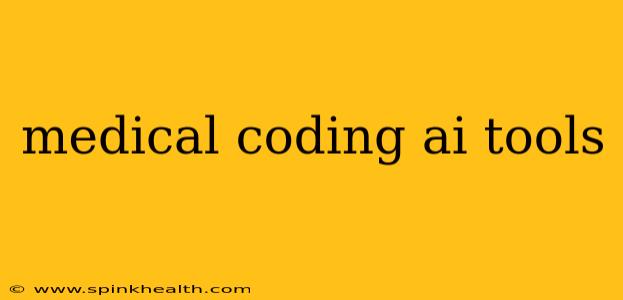The world of medical coding is undergoing a dramatic transformation, thanks to the rise of artificial intelligence (AI). Gone are the days of painstaking manual processes; today, AI-powered tools are streamlining workflows, improving accuracy, and ultimately, saving healthcare providers valuable time and resources. But with so many options emerging, how do you choose the right AI medical coding tool for your needs? Let's delve into the exciting world of AI in medical coding.
What are the benefits of using AI in medical coding?
Imagine a world where coding errors are minimized, claims are processed faster, and your staff has more time to focus on patient care. That's the promise of AI in medical coding. The benefits are multifaceted:
-
Increased Accuracy: AI algorithms can identify and flag potential coding errors, reducing the likelihood of denials and improving reimbursement rates. Think of it as having a super-powered second pair of eyes constantly reviewing your work.
-
Reduced Time Spent on Coding: Automating tedious tasks like chart review and code assignment frees up coders to handle more complex cases and focus on higher-value work. This translates directly into improved efficiency and productivity.
-
Improved Revenue Cycle Management: By speeding up the coding process and reducing errors, AI contributes to a smoother and more efficient revenue cycle, ultimately improving your bottom line.
-
Enhanced Compliance: AI tools can help ensure compliance with ever-changing coding guidelines and regulations, minimizing the risk of penalties and audits. Staying compliant is crucial, and AI makes it significantly easier.
-
Better Data Analysis and Insights: AI tools can analyze coding data to identify trends and patterns, providing valuable insights into your practice's performance and areas for improvement. This data-driven approach helps optimize your processes for maximum efficiency.
What are the different types of AI-powered medical coding tools?
The market is brimming with innovative tools, each with its own strengths and capabilities. Some focus on specific aspects of coding, while others offer a more comprehensive suite of features. Here are some common categories:
-
Automated Code Assignment Tools: These tools utilize natural language processing (NLP) and machine learning to analyze clinical documentation and automatically suggest the appropriate ICD and CPT codes.
-
Coding Compliance and Auditing Tools: Designed to identify potential coding errors and compliance issues, these tools help ensure accuracy and minimize the risk of denials.
-
Predictive Analytics Tools: These sophisticated tools analyze historical data to predict future coding trends and potential challenges, allowing for proactive adjustments to improve efficiency and revenue.
How accurate are AI medical coding tools?
Accuracy is paramount in medical coding. While no system is perfect, leading AI tools boast impressive accuracy rates, often exceeding 90%. However, it's crucial to remember that these tools are designed to assist coders, not replace them entirely. Human oversight remains essential for ensuring accuracy and addressing complex or unusual cases. Think of AI as a powerful assistant, not a replacement for human expertise.
How do I choose the right AI medical coding tool?
Selecting the ideal tool depends on your specific needs and budget. Consider the following factors:
-
Size of your practice: A small practice might benefit from a simpler, more affordable tool, while a larger practice might require a more comprehensive system.
-
Specific coding needs: Focus on tools that address your most pressing challenges, whether it's improving accuracy, speeding up the coding process, or enhancing compliance.
-
Integration with your existing systems: Seamless integration with your EHR and other software is crucial for efficient workflow.
-
Cost and support: Evaluate the total cost of ownership, including licensing fees, training, and ongoing support.
What are the potential challenges of using AI in medical coding?
While AI offers significant benefits, it's important to acknowledge potential challenges:
-
Data security and privacy: Ensuring the security and privacy of sensitive patient data is paramount when using AI tools.
-
Integration complexity: Integrating AI tools into existing systems can sometimes be complex and require specialized expertise.
-
Cost of implementation and maintenance: Implementing and maintaining AI tools can involve significant upfront and ongoing costs.
-
Algorithm bias: Ensuring that AI algorithms are free from bias is essential for fairness and accuracy.
The future of medical coding is undeniably intertwined with AI. By embracing these innovative tools, healthcare providers can improve accuracy, efficiency, and ultimately, the quality of patient care. The journey may present some challenges, but the rewards are significant for those who embrace the technology.

